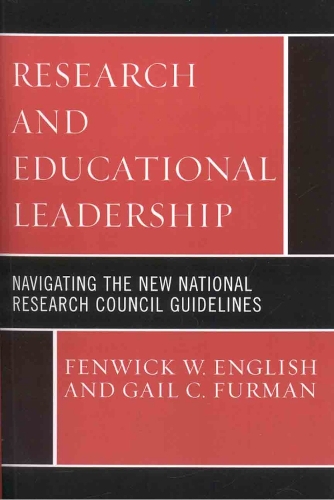
Research and Educational Leadership: Navigating the New National Research Council Guidelines
(Paperback)
Publishing Details
Research and Educational Leadership: Navigating the New National Research Council Guidelines
By (Author) Fenwick W. English
Edited by Gail C. Furman
Contributions by Carol F. Karpinski
Contributions by Catherine A. Lugg
Contributions by Margaret Terry Orr
Contributions by Carolyn Riehl
Contributions by Carolyn M. Shields
Contributions by Linda C. Tillman
Contributions by Michelle D. Young
Bloomsbury Publishing PLC
Rowman & Littlefield Education
18th October 2006
United States
Classifications
General
Non Fiction
370.72
Physical Properties
Paperback
192
Width 152mm, Height 228mm, Spine 17mm
304g
Description
Research and Educational Leadership is the first book to directly address the implications of the National Research Council's (NRC's) Scientific Research in Education (2002) in the fields of educational leadership and school administration. This text points out the strengths and weaknesses of the NRC's recommendations and specifically identifies areas that are not likely to lead to either theoretical or practical advances in practice or new knowledge if the NRC's guidelines become dominant in determining the value of research. Research and Educational Leadership is an invaluable tool in rethinking how research is conducted in educational leadership and how public and private funding agencies should view research proposals for improving leadership practices in schools. It is also a key resource for teaching researchers to think more deeply about school leadership as they engage in dissertation research. Practitioners will also find the work an important reference in understanding what kinds of research are likely to promote improved comprehension of leadership practices and social justice.
Reviews
As a new wave of logical positivism gains momentum in the United States educational system, it is important to reflect on the lessons of history and to understand contemporary critiques of how 'scientific' research canand cannotinform educators work in schools. The chapters in this book span an impressive array of perspectives and will help researchers and practitioners alike realize the limitations and strengths of scientific research on educational leadership. -- Jeffrey Brooks, Florida State University
Amid criticisms that research in educational leadership has lacked rigor and practicality, this book clearly and evocatively demonstrates that this complex area of inquiry involves more than merely determining what, for example, is the best reading program to be employed in a given school or class. Rather, by acknowledging that the study of educational leadership involves the full range of human art and inquiry, including, but not limited to, theory, philosophy, law, and curriculum, to name a few, the authors challenge educational researchers (and consumers) to come to grips with some of the quintessential questions that vex the professional lives of academicians and practitioners who are interested in improving the quality of leadership for our schools. -- Charles J. Russo
The seven chapters raise a number of pertinent issues about relevance and rigor that deserve the attention of all researchers...Highly recommended. * Choice Reviews *
I commend each of the authors in this book for stimulating the dialogue in our profession on the relevance and rigor of educational research. They all have contributed to that continuing purpose of UCEA to inform and improve research that benefits all students, families, and educators. -- Gary M. Crow, UCEA Executive Committee member and chair of the Department of Educational Leadership and Policy, University of Utah
Author Bio
Fenwick W. English is the R. Wendell Eaves Distinguished Professor of Educational Leadership in the School of Education at the University of North Carolina at Chapel Hill. He is a former public superintendent of schools, middle school principal, classroom teacher, and author or co-author of more than twenty books in educational leadership.
Gail C. Furman is professor and program coordinator of the Educational Leadership Program at Washington State University and a past president of the University Council for Educational Administration. She has published numerous books and articles on her research emphasesmoral leadership, community, and ecojustice.
